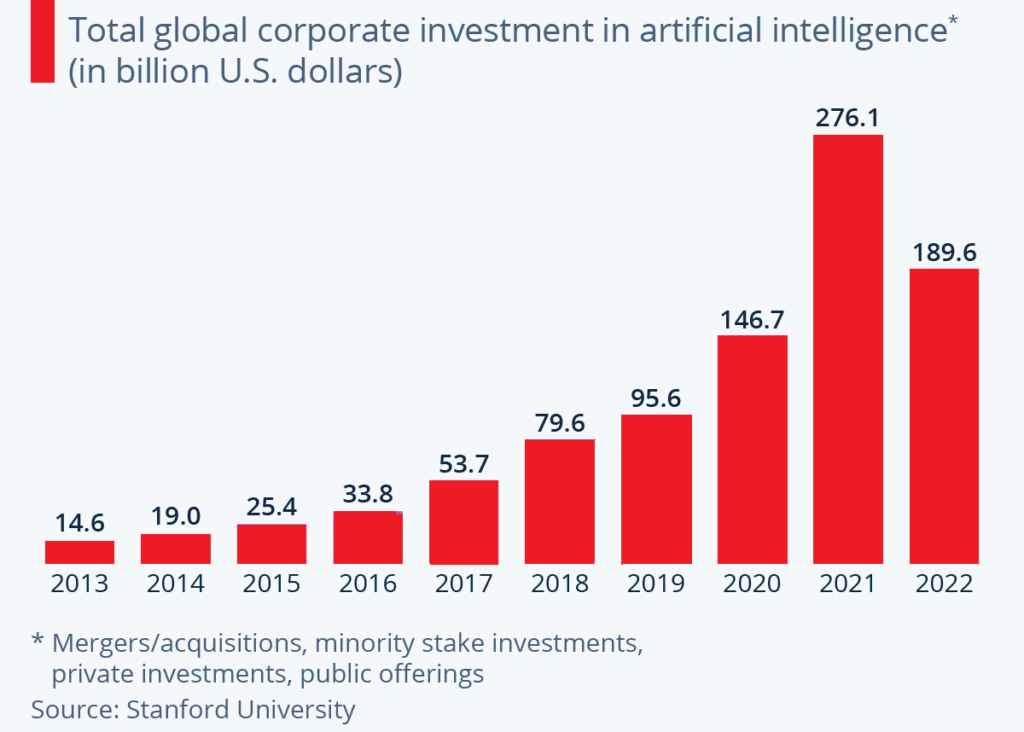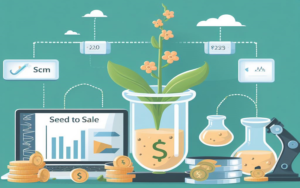Introduction
Advances in AI models have made them more efficient and capable while reducing operational costs. However, this efficiency has spurred broader adoption across industries (e.g., automation in programming and data analysis), leading to increased demand for computational resources like semiconductors.
The Jevons Paradox, an economic principle stating that increases in efficiency often lead to higher overall consumption, has been observed in the context of DeepSeek AI. DeepSeek, a Chinese AI startup, recently introduced its R1 model, which achieves comparable performance to leading AI systems like OpenAI’s ChatGPT while requiring significantly less computational power and energy. This efficiency has made the technology more accessible and affordable, spurring wider adoption across industries.
Email marketing is one of the most effective and widely used digital marketing channels. According to Statista.Com, there were over 4 billion email users worldwide in 2023, and this number is expected to grow to 4.6 billion by 2025. Email marketing also has a high return on investment (ROI), with an average of $42 for every $1 spent, according to Litmus.
However, email marketing is also one of the most challenging and time-consuming marketing activities. You have to create engaging and relevant content, segment and personalize your audience, optimize your deliverability and performance, and comply with data protection regulations. You also have to compete with hundreds of other emails that your recipients receive every day.
This is where artificial intelligence (AI) can help. Artificial intelligence is the technology that enables machines to perform tasks that normally require human intelligence, such as learning, reasoning, and decision making. Artificial intelligence can help you automate and optimize your email marketing campaigns, and deliver personalized and timely messages to your customers and prospects.
In this blog post, we will explore how AI can transform your email marketing strategy in 2023. We will cover the following topics:
- What is AI email marketing and how does it work?
- What are the benefits of using AI email marketing?
- What are the best AI email marketing tools and platforms?
- How to get started with AI email marketing?
Table of Contents
Artificial Intelligence email marketing and how does it work?
Artificial intelligence email marketing is the use of AI to enhance and streamline your email marketing campaigns. Artificial intelligence email marketing tools and platforms use data and machine learning to help you create, send, and analyze your email campaigns. Machine learning is a branch of AI that enables machines to learn from data and improve their performance over time.
Artificial intelligence email marketing tools and platforms can help you with various aspects of your email marketing strategy, such as:
- Content creation: Artificial intelligence can help you write compelling and effective email content, such as subject lines, headlines, body text, and calls to action. Artificial intelligence can also generate dynamic and personalized content based on your recipients’ behavior, preferences, and interests.
- Audience segmentation and personalization: Artificial intelligence can help you segment and personalize your email list based on various criteria, such as demographics, location, purchase history, browsing behavior, and engagement level. Artificial intelligence can also help you create and update your buyer personas and customer journeys, and tailor your email campaigns accordingly.
- Campaign optimization and testing: Artificial intelligence can help you optimize and test your email campaigns to improve your open rates, click-through rates, conversions, and revenue. Artificial intelligence can help you determine the best time and frequency to send your emails, the best layout and design to use, and the best content and offers to include. Artificial intelligence can also help you run A/B tests and multivariate tests to compare different versions of your email campaigns and identify the best performers.
- Analytics and reporting: Artificial intelligence can help you analyze and report on your email campaign performance and results. Artificial intelligence can help you track and measure various metrics, such as deliverability, opens, clicks, conversions, revenue, and ROI. Artificial intelligence can also help you generate insights and recommendations to improve your email marketing strategy and tactics.
What are the benefits of using AI email marketing?
Using AI email marketing can bring you many benefits, such as:
- Saving time and resources: Artificial intelligence email marketing can help you automate and streamline your email marketing processes, and reduce the manual and repetitive tasks that you have to do. This can save you time and resources, and allow you to focus on more strategic and creative aspects of your email marketing.
- Improving performance and ROI: Artificial intelligence email marketing can help you improve your email campaign performance and ROI, by delivering more relevant and engaging content, optimizing your email delivery and timing, and testing and improving your email elements and variables. This can increase your email open rates, click-through rates, conversions, and revenue, and ultimately, your ROI.
- Enhancing customer experience and loyalty: Artificial intelligence email marketing can help you enhance your customer experience and loyalty, by providing personalized and timely messages, offering value and solutions, and building trust and rapport. This can increase your customer satisfaction, retention, and advocacy, and reduce your churn and unsubscribe rates.
What are the best AI email marketing tools and platforms?
There are many AI email marketing tools and platforms available in the market, each with its own features and benefits. Here are some of the best AI email marketing tools and platforms that you can use in 2023:
- ActiveCampaign: ActiveCampaign is a platform that combines email marketing, marketing automation, sales automation, and CRM. ActiveCampaign uses AI to help you create and send personalized and targeted email campaigns, based on your contacts’ behavior and interests. ActiveCampaign also uses AI to help you optimize your email deliverability, performance, and testing. ActiveCampaign has more than 500 integrations and advanced segmentation and personalization options. However, it can be expensive and complex for some users.
- HubSpot: HubSpot is a comprehensive platform that offers marketing, sales, service, and CRM software. HubSpot uses AI to help you create and manage email campaigns, landing pages, webinars, surveys, forms, and more. HubSpot also uses AI to help you segment and personalize your email list, optimize your email delivery and timing, and analyze and report on your email results. HubSpot is known for its inbound marketing methodology and its extensive features and integrations. However, it can be costly and difficult to set up and maintain.
- Mailchimp: Mailchimp is a leading email marketing service that also provides landing pages, websites, e-commerce, and customer relationship management tools. Mailchimp uses AI to help you design and send professional and responsive emails, with drag and drop editors and templates. Mailchimp also uses AI to help you automate your email marketing, segment and personalize your audience, optimize your email performance and testing, and generate insights and recommendations. Mailchimp is easy to use and has a generous free plan for up to 2,000 subscribers. However, it may lack some of the features and integrations that HubSpot and ActiveCampaign offer, such as live chat and SMS.
- Phrasee: Phrasee is a tool that uses AI to help you write better email subject lines, headlines, and body copy. Phrasee uses natural language generation (NLG) to create and optimize email content that matches your brand voice and tone. Phrasee also uses natural language processing (NLP) to analyze your email performance and provide feedback and suggestions. Phrasee can help you increase your email open rates, click-through rates, and conversions. However, it does not offer other email marketing features, such as segmentation, personalization, and analytics.
- Seventh Sense: Seventh Sense is a tool that uses AI to help you optimize your email send time and frequency. Seventh Sense analyzes your email data and your contacts’ behavior to determine the best time and day to send your emails to each individual recipient. Seventh Sense can help you improve your email deliverability, engagement, and conversions. However, it does not offer other email marketing features, such as content creation, segmentation, and personalization.
- Optimail: Optimail is a tool that uses AI to help you automate and optimize your email marketing campaigns. Optimail uses machine learning to learn from your email data and your contacts’ behavior, and automatically adjust your email content, timing, and frequency to maximize your results. Optimail can help you increase your email open rates, click-through rates, conversions, and revenue. However, it does not offer other email marketing features, such as landing pages, webinars, and surveys.
How to get started with AI email marketing?
If you want to get started with AI email marketing, here are some steps that you can follow:
- Define your email marketing goals and strategy: Before you use any AI email marketing tool or platform, you should have a clear idea of what you want to achieve with your email marketing, and how you plan to do it. You should define your email marketing goals, such as increasing your email list, generating more leads, boosting your sales, or retaining your customers. You should also define your email marketing strategy, such as your target audience, your value proposition, your email content, your email frequency, and your email metrics.
- Choose the right AI email marketing tool or platform: Based on your email marketing goals and strategy, you should choose the right AI email marketing tool or platform that suits your needs and preferences. You should consider various factors, such as the features, benefits, pricing, integrations, and support of each tool or platform. You should also compare different tools and platforms, and read reviews and testimonials from other users. You can also sign up for free trials or demos to test the functionality and usability of each tool or platform.
- Set up and integrate your AI email marketing tool or platform: Once you have chosen your AI email marketing tool or platform, you should set up and integrate it with your existing tools and platforms, such as your website, your CRM, your e-commerce platform, and your analytics tool. You should also import and sync your email list and data, and configure your settings and preferences. You should also familiarize yourself with the features and functionalities of your AI email marketing tool or platform, and learn how to use them effectively.
- Create and launch your AI email marketing campaigns: After you have set up and integrated your AI email marketing tool or platform, you can start creating and launching your AI email marketing campaigns. You can use the AI features and functionalities of your tool or platform to help you with various aspects of your email marketing campaigns, such as content creation, audience segmentation and personalization, campaign optimization and testing, and analytics and reporting. You should also monitor and measure your email campaign performance and results, and make adjustments and improvements as needed.
How Much Are Companies Investing in AI
According to Statista.Com over the last decade, global corporate investment in artificial intelligence has experienced a significant surge. According to a comprehensive analysis by Stanford University, the cumulative total of mergers and acquisitions, minority stakes, private investments, and public offerings reached an impressive $934.2 billion from 2013 to 2022.
Highlighted in the chart below in Figure 1.0, the pinnacle of recent investments occurred in 2021, witnessing an infusion of $276.1 billion into the AI sector by businesses worldwide. Although a dip was noted in 2022, the landscape shifted with the introduction of OpenAI’s groundbreaking generative AI tool, ChatGPT, in November of that year. This release marked a turning point, solidifying AI as the unequivocal frontier for innovation, with major players in the tech industry now heavily prioritizing advancements in this domain.
These insights, illustrated in Figure 1.0 below, are derived from meticulous data tracking that spans over 8 million global public and private companies. The trends underscore a dynamic and rapidly evolving investment landscape, emphasizing the growing significance of artificial intelligence in shaping the future of global business.

Harnessing AI for Personalization
One of the most significant contributions of AI to email marketing is in the realm of personalization. Traditional email campaigns often follow a one-size-fits-all approach, leading to generic messages that may not resonate with individual recipients. Artificial intelligence, on the other hand, enables marketers to create highly personalized and targeted email campaigns.
Predictive Analytics for Personalized Content
Artificial intelligence algorithms analyze vast amounts of data to gain insights into customer behavior, preferences, and engagement patterns. By leveraging predictive analytics, marketers can anticipate what content will resonate with each recipient. For instance, if a customer frequently clicks on product recommendations for outdoor gear, AI algorithms can predict their interest in upcoming camping equipment releases.
This predictive power allows marketers to craft hyper-personalized emails that cater to individual preferences, increasing the likelihood of engagement and conversions. This not only enhances the customer experience but also builds a stronger connection between the brand and the consumer.
Dynamic Content Generation
Artificial intelligence-driven dynamic content generation takes personalization to the next level. Instead of manually creating multiple versions of an email for different audience segments, AI algorithms dynamically generate content based on each recipient’s preferences and behavior. This ensures that every individual receives an email tailored specifically to their interests.
For instance, an e-commerce company can use AI to dynamically showcase products based on a customer’s browsing history, purchase behavior, and preferences. This not only saves time for marketers but also ensures that the content remains relevant and engaging for the recipient.
Optimizing Email Campaigns with AI
Beyond personalization, AI plays a crucial role in optimizing the overall performance of email campaigns. From send times to subject lines, AI algorithms analyze data to make informed decisions that maximize engagement and conversion rates.

Smart Send Times
The timing of an email can significantly impact its effectiveness. Sending an email when the recipient is most likely to check their inbox increases the chances of it being opened and acted upon. Artificial intelligence analyzes historical data, considering factors such as time zone, past engagement patterns, and device usage, to determine the optimal send time for each recipient.
By employing AI-driven smart send times, marketers can ensure that their emails reach recipients at the moment when they are most receptive. This not only boosts open rates but also enhances the overall impact of the campaign.
Subject Line Optimization
Crafting compelling subject lines is an art, and AI brings a scientific approach to this crucial aspect of email marketing. Natural Language Processing (NLP) algorithms analyze the language and structure of subject lines to predict their effectiveness. By considering factors such as emotion, length, and keywords, AI helps marketers choose subject lines that are more likely to grab attention and entice recipients to open the email.
Additionally, some AI tools even use A/B testing to experiment with different subject lines and identify the most effective ones. This data-driven approach allows marketers to refine their strategies continually, improving the performance of future campaigns.
Enhancing Customer Engagement through AI
Beyond the initial click, AI continues to play a role in enhancing customer engagement throughout the customer journey. From automated responses to predictive recommendations, AI-powered features contribute to a more interactive and responsive email experience.
Intelligent Chatbots and Automated Responses
Integrating intelligent chatbots into email campaigns enables real-time interaction with recipients. These chatbots can answer frequently asked questions, provide product recommendations, and even assist with the purchase process directly within the email. Artificial intelligence algorithms power these chatbots, allowing them to understand and respond to user queries in a natural and conversational manner.
Automated responses go hand-in-hand with chatbots, allowing businesses to acknowledge customer inquiries and feedback promptly. Whether it’s a thank-you message or a follow-up email based on a specific action, AI-driven automation ensures that customers receive timely and relevant responses, fostering a sense of responsiveness and engagement.
Predictive Recommendations
Artificial intelligence algorithms can analyze a customer’s past behavior and preferences to predict their future needs. In the context of email marketing, this translates to predictive product recommendations. For example, if a customer has recently purchased a camera, AI can analyze similar customer journeys and suggest relevant accessories or complementary products.
This not only adds value to the customer but also increases the likelihood of additional purchases. Predictive recommendations are a powerful tool for cross-selling and upselling, contributing to revenue growth while providing a personalized and enjoyable shopping experience for the customer.
Overcoming Challenges and Ethical Considerations
While the integration of AI into email marketing brings forth numerous benefits, it also raises certain challenges and ethical considerations.
Data Privacy and Security
As AI relies heavily on data, ensuring the privacy and security of customer information is paramount. Marketers must adhere to stringent data protection regulations and implement robust security measures to safeguard customer data from potential breaches. Transparent communication about data usage and obtaining explicit consent from customers is crucial in building trust and maintaining compliance.
Avoiding Overreliance on Automation
While automation enhances efficiency, it’s essential to strike a balance and avoid overreliance on AI. Human intuition, creativity, and empathy remain irreplaceable in marketing. Artificial intelligence should be viewed as a tool to augment human capabilities rather than a substitute. Marketers should retain control over the overarching strategy, using AI as a facilitator to achieve their goals more effectively.
Mitigating Bias in AI Algorithms
Artificial intelligence algorithms are only as good as the data they are trained on. If the training data contains biases, it can result in biased predictions and recommendations. Marketers must actively work to identify and mitigate biases in AI algorithms to ensure fair and equitable outcomes. Regular audits and adjustments to the algorithms can help address this issue, promoting diversity and inclusivity in marketing efforts.
The Future of AI in Email Marketing
As technology continues to advance, the future of AI in email marketing holds even more promise. Emerging technologies such as machine learning, natural language processing, and advanced automation capabilities will further elevate the sophistication and effectiveness of email campaigns.
Hyper-Personalization with Predictive AI
The evolution of predictive AI will take hyper-personalization to new heights. Artificial intelligence algorithms will become more adept at understanding and predicting individual preferences, allowing marketers to create highly targeted and relevant content on a granular level. From the subject line to the body of the email, every element will be finely tuned to resonate with each recipient.
Integration with Emerging Technologies
The integration of AI with other emerging technologies will redefine the email marketing landscape. For example, the combination of AI and augmented reality (AR) could enable immersive and interactive email experiences. Customers might be able to virtually try on products or visualize items in their own space directly within the email, enhancing the overall engagement and shopping experience.
Continued Emphasis on Ethics and Privacy
As AI becomes more ingrained in marketing practices, the ethical use of data and a commitment to customer privacy will remain at the forefront. Businesses that prioritize transparency, consent, and ethical AI practices will not only comply with regulations but also build trust with their customer base. Ethical considerations will continue to shape the development and implementation of AI in email marketing.
Conclusion
Artificial intelligence email marketing is a powerful and innovative way to grow your business with email marketing. By using AI, you can:
- Personalize your emails to match the preferences, behavior, and interests of each subscriber. This can increase your open rates, click-through rates, and conversions. [HubSpot AI Tools] and [Mailchimp] are some examples of AI email marketing tools that offer personalization features.
- Optimize your email campaigns to deliver the right message at the right time to the right audience. You can use AI to test different subject lines, content, images, and calls to action, and find the best performing ones. You can also use AI to automate your email workflows and segment your lists based on various criteria. ActiveCampaign and MailerLite are some tools that can help you create and optimize your email content with AI.
- Analyze your email performance to measure the effectiveness of your email marketing strategy and identify areas for improvement. You can use AI to track and visualize your email metrics, such as open rates, click rates, bounce rates, unsubscribe rates, and revenue. You can also use AI to generate insights and recommendations based on your data. AWeber and Benchmark Email are some tools that can help you analyze your email performance with AI.
Artificial intelligence email marketing is not a futuristic concept, but a reality that is already transforming the way businesses communicate with their customers. By leveraging AI, you can create more engaging, relevant, and profitable email campaigns that will help you achieve your marketing goals.
Please also see my email marketing guide at: Email Marketing Guide 2023.





